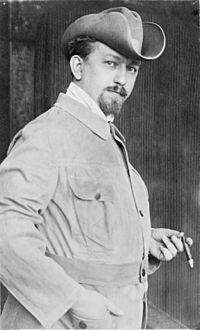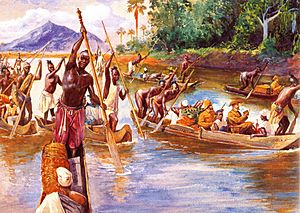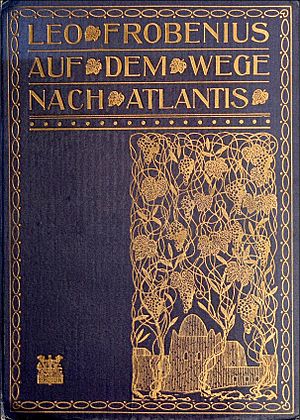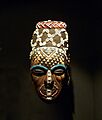Leo Frobenius facts for kids
Quick facts for kids
Leo Frobenius
|
|
|---|---|
 |
|
| Born | 29 June 1873 |
| Died | 9 August 1938 (aged 65) |
| Nationality | German |
| Scientific career | |
| Fields | Ethnology |
| Influenced | Adolf Ellegard Jensen Joseph Campbell< Oswald Spengler Ezra Pound Aimé Césaire Léopold Sédar Senghor |
Leo Viktor Frobenius (born June 29, 1873 – died August 9, 1938) was a German scientist. He taught himself about different cultures (an autodidact). He was an ethnologist, which means he studied human cultures and societies. He was also an archaeologist, someone who studies human history by digging up old things. Frobenius was a very important person in German ethnography, the scientific description of peoples and cultures.
Contents
Life and Expeditions
Leo Frobenius was born in Berlin, Germany. His father was an officer. Leo died in Biganzolo, Italy, near a lake called Lago Maggiore.
In 1904, he went on his first trip to Africa. He traveled to the Kasai district in the Belgian Congo. During this trip, he started thinking about his "African Atlantis" theory.
During World War I (1916-1917), Frobenius spent almost a year in Romania. He traveled with the German Army to do scientific research. His team studied old sites and different cultures in the country. They also recorded the daily lives of people in a prisoner camp. Many photos and drawings from this time are kept at the Frobenius Institute.
Until 1918, he explored western and central Sudan, and parts of northern and northeastern Africa. In 1920, he started an institute in Munich. It was called the Institute for Cultural Morphology.
Frobenius also taught at the Goethe University Frankfurt in Germany. In 1925, the city bought his huge collection of about 4,700 ancient African stone paintings. These paintings are kept at the university's institute for studying cultures. In 1946, this institute was named the Frobenius Institute in his honor.
In 1932, he became an honorary professor at the University of Frankfurt. In 1935, he became the director of the city's museum for different cultures.
Frobenius's Theories
Frobenius was influenced by other thinkers like Richard Andree and Friedrich Ratzel.
In the late 1890s, Frobenius came up with the idea of "culture circles" (Kulturkreise). He believed that cultures with similar features spread these traits through sharing or by one group taking over another.
He also used the term paideuma. This word described a special way of thinking or creating meaning. He thought this way of thinking was unique to certain types of societies. For example, he tried to understand the worldview of hunters or early farmers. He saw culture as a living thing, like an organism. His student, Adolf Ellegard Jensen, continued this idea. It also influenced Oswald Spengler, another famous thinker.
Frobenius's writings, especially with Douglas Fox, helped bring African stories into European literature. One example is Gassire's lute, an epic poem from West Africa. Frobenius found this story in Mali. The American poet Ezra Pound even included parts of this story in his famous work, Cantos.
The "African Atlantis" Idea
Around 1904, Leo Frobenius suggested a theory about a lost civilization in northern Africa. He called it "African Atlantis," named after the mythical island of Atlantis. He thought this lost civilization was the origin of African culture and social structures.
However, Frobenius's theory had a big problem. He wrongly believed that a "white civilization" must have existed in Africa before Europeans arrived. He thought that this "white" influence was responsible for advanced African achievements. These included military power, political leadership, and large buildings. This idea was based on racist beliefs. It incorrectly suggested that native Africans could not have developed these things on their own. He thought this supposed "white" civilization must have disappeared long ago. This, he believed, explained why African cultures seemed less "advanced" to him at the time. Today, we know that African cultures developed their own rich histories and achievements.
Legacy and Impact
Frobenius is still well-known in many African countries because of his studies of African history. For example, he influenced Léopold Sédar Senghor. Senghor was one of the founders of a movement called Négritude. He once said that Frobenius "gave Africa back its dignity and identity." Aimé Césaire, another important writer, quoted Frobenius as saying African people were "civilized to the marrow of their bones." This was a contrast to the negative ideas spread by colonial propaganda.
On the other hand, the Nigerian writer Wole Soyinka criticized Frobenius. In his 1986 Nobel Lecture, Soyinka called Frobenius's views "schizophrenic." He pointed out that Frobenius praised Yoruba traditional art but then called the people who created it "degenerate and feeble-minded." Soyinka saw this as an excuse to take away African art and culture.
Frobenius also confirmed the importance of the moon in some African cultures. This was part of his work on ancient matriarchal cultures in Africa.
Images for kids
See also
 In Spanish: Leo Frobenius para niños
In Spanish: Leo Frobenius para niños
 | Jackie Robinson |
 | Jack Johnson |
 | Althea Gibson |
 | Arthur Ashe |
 | Muhammad Ali |








